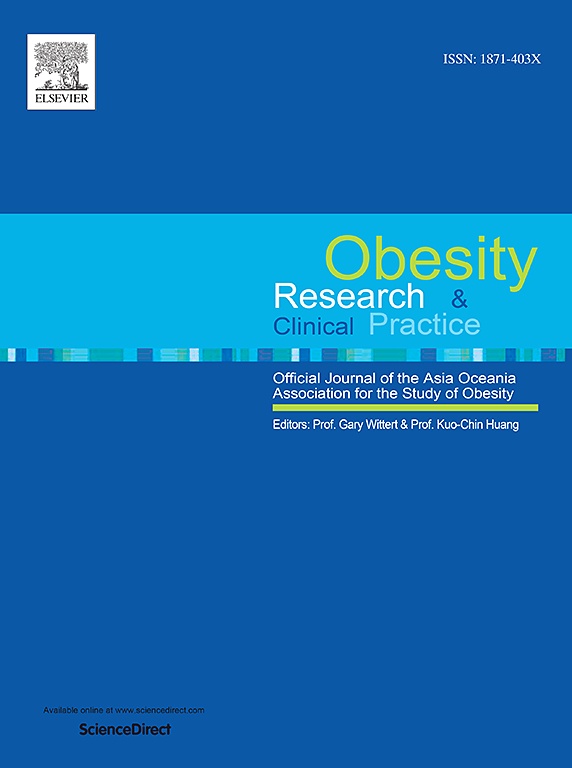Interventions to prevent or treat obesity in adult Indigenous Australians: A systematic review
IF 2.5
4区 医学
Q3 ENDOCRINOLOGY & METABOLISM
引用次数: 0
Abstract
Background
Aboriginal and Torres Strait Islander (Indigenous) Australians experience a disproportionately higher prevalence of obesity compared with non-Indigenous Australians. We aimed to describe existing research into lifestyle, pharmacological or surgical interventions for preventing or treating obesity in Indigenous Australians.
Methods
A systematic review of published and grey literature was performed. Medline, Embase, Emcare (on the OVID platform), Web of Science and website searches were conducted to April 2024. Observational and randomised studies of adult Indigenous Australians were included if an intervention was implemented to prevent and/or treat obesity and post-intervention results were reported. The PRISMA systematic review reporting methods was used to collate data.
Results
Of 1019 records screened, 17 were included; most described educational initiatives or lifestyle programs for improving diet and exercise. There were no reports of pharmacotherapies for weight management. The effect of lifestyle programs on weight reduction was modest (∼2–4 kg after 4–12 months). There were five reports on short-term (12 week) structured exercise programs. Two non-randomised studies of structured exercise showed reduction in weight in the highest weight groups whilst the two randomised trials showed ∼2 kg weight reduction compared with control. One observational study described mean ∼26 kg weight reduction at two years after laparoscopic adjustable gastric banding in 26 Indigenous Australians.
Conclusions
Community-based lifestyle interventions to manage excess weight can be successfully conducted in Indigenous Australians, but with generally limited efficacy. Providing background community-based lifestyle programs may facilitate the conduct of randomised trials of newer, effective anti-obesity pharmacotherapy in this high priority population.
预防或治疗成年澳大利亚土著居民肥胖的干预措施:系统回顾
澳大利亚土著居民和托雷斯海峡岛民(土著)与非土著澳大利亚人相比,肥胖的患病率高得不成比例。我们的目的是描述现有的关于澳大利亚土著居民预防或治疗肥胖的生活方式、药物或手术干预的研究。方法系统回顾已发表文献和灰色文献。Medline、Embase、Emcare(在OVID平台上)、Web of Science和网站搜索进行到2024年4月。如果实施了预防和/或治疗肥胖的干预措施,并报告了干预后的结果,则纳入对成年澳大利亚土著居民的观察性和随机研究。采用PRISMA系统评价报告方法整理资料。结果筛选的1019份病历中,纳入17份;大多数描述了改善饮食和锻炼的教育倡议或生活方式计划。没有关于体重控制的药物治疗的报道。生活方式计划对体重减轻的影响不大(4-12个月后~ 2-4 kg)。有五份关于短期(12周)有组织的锻炼计划的报告。两项结构化运动的非随机研究显示,最高体重组的体重减轻,而两项随机试验显示,与对照组相比,体重减轻了~ 2 kg。一项观察性研究描述了26名澳大利亚原住民在腹腔镜下可调节胃束带术后2年体重平均减少26 kg。结论:以社区为基础的生活方式干预可以成功地管理澳大利亚土著居民的超重,但通常效果有限。提供以社区为基础的生活方式计划可能有助于在这一高优先人群中进行新的、有效的抗肥胖药物治疗的随机试验。
本文章由计算机程序翻译,如有差异,请以英文原文为准。
求助全文
约1分钟内获得全文
求助全文
来源期刊

Obesity research & clinical practice
医学-内分泌学与代谢
CiteScore
7.10
自引率
0.00%
发文量
80
审稿时长
49 days
期刊介绍:
The aim of Obesity Research & Clinical Practice (ORCP) is to publish high quality clinical and basic research relating to the epidemiology, mechanism, complications and treatment of obesity and the complication of obesity. Studies relating to the Asia Oceania region are particularly welcome, given the increasing burden of obesity in Asia Pacific, compounded by specific regional population-based and genetic issues, and the devastating personal and economic consequences. The journal aims to expose health care practitioners, clinical researchers, basic scientists, epidemiologists, and public health officials in the region to all areas of obesity research and practice. In addition to original research the ORCP publishes reviews, patient reports, short communications, and letters to the editor (including comments on published papers). The proceedings and abstracts of the Annual Meeting of the Asia Oceania Association for the Study of Obesity is published as a supplement each year.
 求助内容:
求助内容: 应助结果提醒方式:
应助结果提醒方式:


